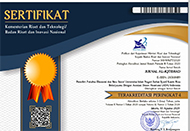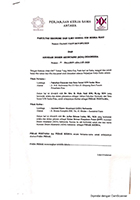Pengaruh Persepsi, Sikap dan Motivasi Beragama Terhadap Perilaku Konsumen dalam Melaksanakan Ibadah Sholat Saat Berwisata
Abstract
Knowing consumer behavior is the most crucial part for companies to attract and win customers. Understanding consumer behavior is not easy. One of the factors that influence a person's behavior is psychological factors. This research is a quantitative descriptive study that in its presentation analyzes and describes descriptively the influence of a person's perception, attitude and religious motivation on his behavior in carrying out prayers while traveling. The research data was obtained by distributing questionnaires to 96 respondents determined by purposive sampling. While the data analysis using multiple linear regression, which was processed using SPSS 21 software. The study results revealed that consumer psychological factors in the form of perceptions, attitudes and motivations together had a positive effect on the behavior of Muslim tourists to pray while traveling. From the research results, it is hoped that this study can encourage the halal tourism industry players to pay attention to additional and supporting facilities so that the length of stay of tourists is better.
Keywords
Full Text:
PDF (Bahasa Indonesia)References
Ajzen, I. (2005). Attitudes, personality, and behavior. McGraw-Hill Education (UK).
Al-Qur’an dan terjemahannya. 2008. Departemen Agama RI. Bandung: Diponegoro.
Assael, Henry, Consumer behaviour & Marketing Action., 1996., 5th Ed., Sousth Western Publishing., New York.
Chattopadhyay, M. (2006). Influence of religion on tourism: Implications for India’s tourism policy. The ICFAI Journal of Consumer Behavior, 1(3), 59-67.
Choi, Y. (2010). Religion, religiosity, and South Korean consumer switching behaviors. Journal of Consumer Behaviour, 9(3), 157-171.
Eagly, A. H., & Chaiken, S. (1998). Attitude structure and function. In D. T. Gilbert & S. T. Fiske (Eds.), The handbook of social psychology (4th ed., Vol. 1, pp. 269–322). Boston, MA: Mcgraw-Hill
Given, Lisa M. (editor). (2008). The Sage encyclopedia of qualitative research methods. Thousand Oaks: Sage
Bianca Vainikka. 2015. Psychological factors influencing consumer behaviour. Business Management. university of applied science.
Ghozali, I. (2013). Aplikasi Analisis Multivariate Dengan Program SPSS 21 Update PLS Regresi (Vol. VII). Semarang: Badan Penerbit Universitas Diponegoro.
Han, H. and Hyun, S.S. 2015. Customer retention in the medical tourism industry: Impact of quality, satisfaction, trust, and price reasonableness. Tourism Management, 46, 20- 29.
Hoyer, W. D., Macinnis, D. J., & Pieters, R. (2012). Consumer Behavior, South-Western, Cengage Learning. International edition.
Jhon M Echols dan Hasan Sadily. 2016. Kamu Bahasa Inggris Indonesia., Pustaka Utama., Edisi ketiga., Jakarta
Jisana, T. K. (2014). Consumer behaviour models: an overview. Sai Om Journal of Commerce & Management, 1(5), 34-43.
Katrakilidis, C., Konteos, G., Sariannidis, N. and Manolidou, C. 2017. Investigation of Convergence in the Tourist Markets of Greece. European Research Studies Journal, 20(4A), 707-729.
Mar’at. 1982. Sikap Manusia, Perubahan serta Pengukurannya. Ghalia Indonesia, Jakarta.
Mowforth, M. and Munt, I. 2015. Tourism and sustainability: Development, globalisation and new tourism in the third world. Routledge.
Notoatmodjo, S. (2010). Ilmu Perilaku Kesehatan. Jakarta: Rineka Cipta.
Page, R. L., Ellison, C. G., & Lee, J. (2009). Does religiosity affect health risk behaviors in pregnant and postpartum women?.Maternal and child health journal, 13(5), 621
Palupi, T. (2017). Hubungan antara sikap dengan perilaku pro-lingkungan ditinjau dari perspektif theory of planned behavior. In Proceeding Biology Education Conference: Biology, Science, Enviromental, and Learning (Vol. 14, No. 1, pp. 214-217).
Schiffman, Leon G and Leslie Lazar Kanuk. 2004. Consumer Behavior. Prentice Hall International, Inc., Eighth Edition, New Jersey.
Setiadi, Nugroho.2003. Perilaku Konsumen: Jakarta: Prenamedia Group.
Shakona, M., Backman, K., Backman, S., Norman, W., Luo, Y., & Duffy, L. (2015). Understanding the traveling behavior of Muslims in the United States. International Journal of Culture, Tourism and Hospitality Research, 9(1), 22-35.
Suprapti, N. W. S. (2010). Perilaku Konsumen: Pemahaman dasar dan aplikasinya dalam strategi pemasaran. Bali: Udayana University Press.
Solomon, Michael R. 2004. Consumer Behavior, Prentice Hall International Edition, Sixth Edition. Needham Heights, Massachusetts.
Tisnawati, E., & Saefullah, K. (2019). Pengantar Manajemen. Jakarta: Kencana.
WEF (2017), The Travel and Tourism Competitiveness Report 2017: Paving the Way for a More Sustainable and Inclusive Future, World Economic Forum, Geneva.
Weidenfeld, A. D. I., & Ron, A. S. (2008). Religious needs in the tourism industry. Anatolia, 19(2), 357-361.
Wdowati, Hari. 2019. 5 tahun terakhir rerata pertumbuhan kunjungan wisawatan mancanegara. https://databoks.katadata.co.id/datapublish. (diakses tanggal 10 Januari 2021)
Yeung, J. W., Chan, Y. C., & Lee, B. L. (2009). Youth religiosity and substance use: a meta-analysis from 1995 to 2007. Psychological Reports, 105(1), 255-266.
DOI: http://dx.doi.org/10.24014/jiq.v17i2.12422
Refbacks
- There are currently no refbacks.















